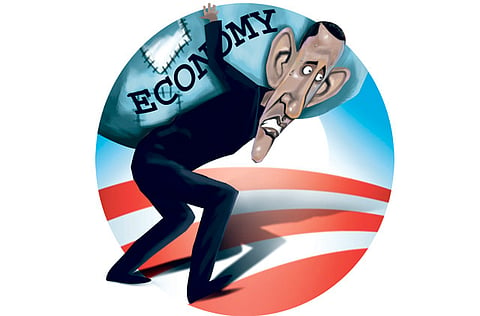Change proves too hard for Obama
Most Americans believe the president does not have a clear strategy

We are now less than four weeks away from the midterm elections in the US. Much can happen in four weeks, but if the current polls are to be believed, US President Barack Obama's Democratic Party is about to suffer a substantial political defeat.
The latest New York Times/CBS News poll found that US voters are remarkably open to change, even if they are not sure where Republicans will lead them. Most Americans, including one-third of those in the coalition that elected Obama, now say he does not have a clear plan to solve the nation's problems or create jobs.
The president's overall job approval rating, according to the survey, is 45 per cent, with 47 per cent disapproving. On the economy, his rating is worse, with 41 per cent approving and 51 per cent disapproving. When asked whether Obama has a clear plan for solving the nation's problems, 57 per cent responded that he did not.
Important as these polls might be in clarifying the picture four weeks ahead of a key political battle, they nevertheless cannot explain why Obama and his Democratic Party are set to lose in the upcoming legislative elections. There are in fact a number of reasons that renders the incumbent president weak and vulnerable. First, Obama was not politically strong from the very moment of his election.
While he won a major victory in the Electoral College, he did not come anywhere near a landslide in the popular vote. About 48 per cent of the voters selected his Republican rival John McCain.
In spite of the surge in popularity Obama received after he was elected, his personal political strength was not overwhelming.
Over the past year, poll numbers indicating support for his presidency have deteriorated to the low 40 per cent range, numbers from which it is difficult for a president to rule unchallenged.
Second, throughout his election campaign, Obama was arguing that the war in Iraq was the wrong war to fight but that the war in Afghanistan was the right one. This positioned him as a powerful contender for the White House but did not make him an anti-war candidate.
Further, when he came into office the situation in Iraq was already improving but the situation in Afghanistan was badly deteriorating. Over the past year, it was the ‘right war' that went wrong as the focus of the US media shifted towards Afghanistan and the rising number of US casualties there.
Worse still, during his election campaign, Obama did not expect the global financial crisis. When he entered the White House, he had no solid strategy to deal with it. He merely continued with the policies of his predecessor with no tangible results so far.
Last but not least, the economic crisis forced Obama to shift his focus from the area where he is institutionally strong to the area where he is institutionally weak — from foreign policy to domestic politics.
The US Constitution gives the president tremendous power in foreign policy, generally unhindered the Congress or other institutions. Domestic politics do not provide such leeway. A Congress divided into two houses, a Supreme Court and the states limit the president dramatically.
If the opinion polls prove correct that would leave Obama in even a weaker position than he already is. In fact, Obama has not so far been running a successful foreign policy anyway. The Middle East peace process is in tatters due to Israel's intransigence on colonies.
Obama's public diplomacy initiative to the Islamic world also did not significantly redefine the game. Relations with China and Russia remain difficult for political and economic reasons.
On the two wars Obama is fighting — Iraq and Afghanistan — no significant progress has been made. On Iran's nuclear problem, almost two years of diplomatic efforts to form an international consensus to pressure Tehran to accept a temporary freeze of uranium enrichment has yielded nothing.
If Obama could not achieve much on these foreign policy issues when he was much more popular in America and abroad, it is difficult to see him performing any better under less favourable conditions.
Dr Marwan Al Kabalan is a lecturer in media and international relations at Damascus University's Faculty of Political Science and Media in Syria.


